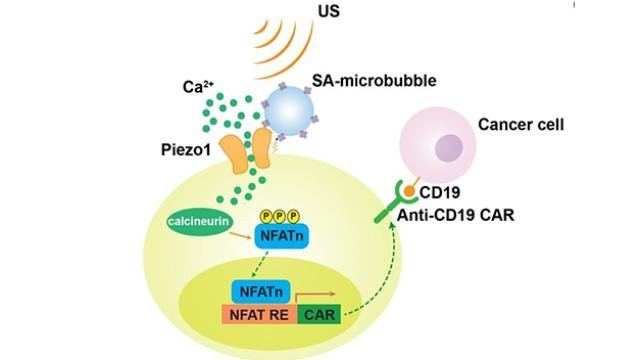Researchers are developing remote-controlled cancer immune systems
A team of researchers has developed an ultrasound-based system that can remotely control genetic processes in immune T cells so they can identify and kill cancer cells.
In this study, researchers said their remote-controlled mechanical systems could be used to create T-cells that could target and kill cancer cells.
Specifically, CAR-T cells designed with mechano sensors and genetic transformation modules can be remotely activated by ultrasound through microbubble amplification mechanism.

Professor Peter Yingxiao Wang of the University of California San Diego said: "CAR-T cell therapy is becoming the optimal method of changing models for cancer treatment. However, the major challenges remain before CAR-based immunotherapy can be widely applied. "
The team brings together laboratories of professors Wang and Shu Chien, both biotechnology professors at Jacobs School of Engineering and the Institute of Medical Engineering at UC San Diego, in collaboration with Professor Kirk Shung of Southern California University and Michel Sadelain at Sloan Kettering Cancer Center in New York. Researchers presented their findings in the Proceedings of the National Academy of Sciences, with Dr. UC San Diego, Yijia Pan, the first author.
The researchers found that microbubble links (Micro Bubbles are tiny bubbles of 0.2 microns in size, a fraction of the size of typical vortex bubbles) with streptavidin (bacterial proteins have The ability to bind to biotin with high affinity and specificity can be combined with the surface of a cell where expression of sensitive muscle Piezo1 ion regions is present. When exposed to ultrasonic waves, vibrating and stimulating microbubbles of Piezo1 ionic regions produce calcium ions inside the cell. This will continue to activate calcineurin (cancer inhibitor), dephoshorylation (the phospharylation) NFAT.
The NFAT is converted into a nucleus that can bind to retrograde response factors of genetic switch modules to initiate gene expression of the chimer (CAR) antigen receptor to identify and kill the target cancer cells.
See more:
- Light can trick the immune system to attack cancer
- Herpes virus is similar to the human infection Epstein-Barr virus found in mountain gorillas
- New findings: Cows are resistant to HIV virus
You should read it
- ★ Scientifically proven: Beer yeast genes can attack viruses invading the body
- ★ DNA vaccine with immunotherapy can treat HPV
- ★ Stunned modern medicine with newly launched tissue regeneration method
- ★ New drugs can prevent genes that cause cancer
- ★ IBM researchers analyzed breast cancer cell structure with AI